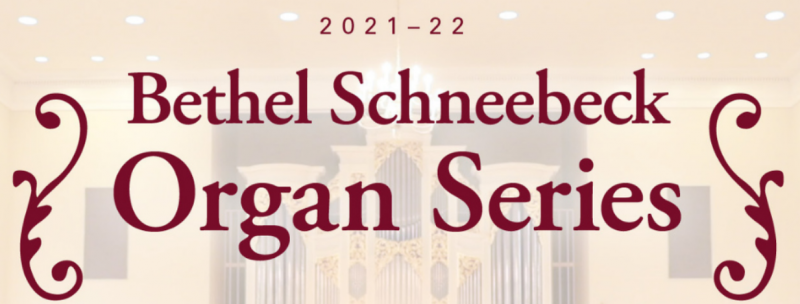
A rainy Sunday afternoon created the perfect backdrop for the 31st Annual Bethel Schneebeck Organ Recital at Kilworth Memorial Chapel.
Dr. Wyatt Smith, the Affiliate Artist for Organ and Harpsichord at the University of Puget Sound, has loved the organ his entire life. Starting at just ten years old, Dr. Smith has played organ all over the world, including a nation-wide tour that saw twenty-eight organ recitals in just ninety days. Now his talent leads him to Puget Sound, where he was the feature in the annual tradition celebrating the Kilworth organ.
This tradition of beautiful organ music was started in honor of Mrs. Bethel Schneebeck, a Puget Sound alum who greatly contributed to the university art scene. The organ, which was built in 1990 by Puget Sound alum and expert organ designer Paul Fritts, is a twenty-foot-tall tribute to Baroque-style architecture. It is incredibly versatile,“It plays the North German music of Bach and Buxtehude, but you can also have the flexibility of playing French Romantic and 20th Century and contemporary American music.” Dr. Smith says. At the recital, Dr. Smith displayed this versatility with distinct and (thrilling) pieces of music from four different composers. The concert was mainly attended by community members who seemed to be well-acquainted with organ music. As a student who knows little to nothing about the organ, I was interested to see how the music would translate.
The concert started with Felix Mendelssohn-Bartholdy’s Allegro, Chorale, and Fugue in d. This nine-minute long piece is one of Mendelssohn’s lesser-known works. Dr. Smith points out the “fast and furious” notes that take over the first third of the piece, before slowing down in the last two-thirds. As an organ amateur, the “fast and furious” notes sounded to me like something you would find in an iconic horror movie score like Halloween. It felt like a heart-pounding, seat-gripping chase.
The next piece in the lineup was Louis-Nicolas Clérambault’s Suite du deuxième ton. A shift from the first piece, Dr. Smith defines the Clérambault work as “French Classical,” a genre he says was based primarily on dance forms. This piece has seven “movements,” or parts, that each evoke a different color and texture. With each page flip to the next movement, the tone shifted from classical, to whimsical, to gothic. I was shown in the grandest possible way the power of the organ and its versatility.
Margaret Vardell Sandresky’s L’homme armé Organ Mass was perhaps the most “traditional” for the common listener. Sandresky, who celebrated her 100th birthday last spring, joined the long-standing tradition of organ composers writing their own version of the Choral Mass. This work “put her on the map,” Dr. Smith said. He also noted that Sandresky was nearly sixty years old when the work was released. Far from wholly traditional, the piece incorporates Choral Mass and a through-line of a secular melody, making the work memorable and unique.
Finally, Dr. Smith played Triptych by Stephen Paulus, a “pioneer for American composers.” Dr. Smith endearingly describes Paulus’s work as “funky” because of the radically different approach he takes to composition. Indeed, this piece was radically different, with an upbeat rhythm I actually found myself bobbing my head to. The recital ended as Dr. Smith promised: “in a blaze of glory.”
As I walked out of Kilworth Chapel that rainy Sunday afternoon, I reflected on my first experience with the organ. It’s amazing what an hour of uninterrupted organ music can do for the soul. I expected to feel as though I had stepped into the past. Yet, Dr. Smith’s selection of music and style of playing took the concert back to the present. It was truly a unique experience that I’m not sure you could find anywhere else.
Sunday’s concert can be accessed on the University Music Department’s website under “Schneebeck Live.” To see and hear the grandiose organ in person, there will be four more organ concerts throughout the semester. All the information for upcoming music events can be found on the University of Puget Sound’s event calendar.
